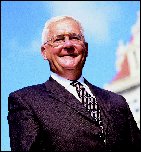
Williams, a no-nonsense wholesaler from upstate New York, embraces the prospect of change. "I'll be excited to see how this White Paper continues to develop," he says. "I think it's a great proposal and its timing is unique. We're about to start a new century with a new approach to addressing the issues that concern us."
Williams was serving as ASA vice president last year when the association started to formulate the White Paper. Although he was not a member of the original task force, Williams says he has been very close to the White Paper's development.
To him, the issue is not survival. Williams believes ASA would still be around even if it does not restructure itself.
"But I think ASA under the revised concept would be a much stronger association with a larger population of the industry as members," he says. "It's good that ASA has examined itself and is making changes.
"After all, we do not run our supply houses as we did before. If we tried to do business as we did 40 years ago, we wouldn't be in business."

Security background check
Forty years ago, Harold Williams had been on the job one year at Security Supply Corp., which then was a three-location plumbing wholesaler based in Selkirk, N.Y., with branches in Albany and Schenectady, N.Y. The company actually began as a spinoff from a contracting business in 1934 when Harold Williams Sr., Earl Vadney and William Bennett Sr. founded Security Supply.During the Great Depression, the plumbers didn't find enough work to go around so Bennett focused on the contracting business while Williams and Vadney tried to peddle their excess inventory to other plumbers. That was the start of their wholesale business.
The contracting and wholesaling companies operated side by side until World War II when the three partners went their separate ways to do their part in the war effort. After the fighting ended, they came back together in Selkirk but this time concentrated on the wholesale supply business.
The postwar construction market in upstate New York was far better than it was during the Depression and Security Supply's three branches prospered. In the 1960s, the company expanded into Glens Falls; that branch was followed by others in Johnstown and Plattsburgh, N.Y., and one in North Adams, Mass., the wholesaler's only location outside New York state.
While those branches were all start-ups, Security did acquire a small supply house in Cohoes, N.Y. In 1994, Security made a larger acquisition when it bought Hyde Plumbing Supply with locations in Watertown and Massena. The newest branch, another start-up, opened a year ago in Kingston.
In addition to Security Supply, Williams also is an owner of PHAC Products, a plumbing master distribution company that started in 1977. Based in Albany, PHAC is a separate corporation and maintains a dedicated inventory and its own staff of five employees but shares the same ownership with Security.
Williams joined Security Supply in 1958 after graduating from college with a business degree.
"I always had it in my mind to give this business a try," he says. "I figured that if I didn't like it, I could always move on to other things. I must have liked it because I've stayed with it for 40 years."
Like many young wholesalers entering the family business, Williams worked at a variety of jobs from the warehouse to purchasing to inside and outside sales to branch manager. He remembers his relationship with his father as being very good.
"He would correct my mistakes but when you're young you make mistakes; that's part of the learning process," Williams says. "It's important for senior managers to correct those mistakes in such a way that they don't deter enthusiasm or discourage people from trying new things. Dad understood that."
The smooth progress of Williams' career and the succession plan for Security Supply were disrupted when Earl Vadney died unexpectedly in 1962. One of the original founders, Vadney had been slated to take the helm of Security after Bennett and the elder Williams. When Harold Williams Sr. retired as president in 1965, William Bennett Jr. took over until Harold Williams Jr. was named to lead the company in 1983.

Security today
Ownership of the company remains in the Williams and Bennett families, and family members remain active in the business. Kevin Williams, Harold's son, is the head of Security's MIS department and treasurer of the corporation. Keith Bennett, who like Kevin Williams is a third-generation wholesaler, became president of Security Supply in 1997 when Harold Williams was named chairman.Security Supply today employs 97 people in 11 locations, which cover northeastern New York, western Massachusetts and Vermont. The number of branches is closely tied to the company's philosophy of doing business.
"Our history is to have our branches close to our customers," Keith Bennett says. "We could have just one big branch in the Albany area, but we service our customers better by being closer to them."
Most of Security's competitors today are still other independent wholesalers. The number of smaller supply houses in New York and New England has, for the most part, kept out bigger companies such as Ferguson, Hughes and Hajoca, Bennett believes. But he sees that changing as some independents decide to sell out, merge or close their doors. Security Supply, by the way, intends to stay active in the acquisition market, Bennett says.
Another factor that could be keeping some larger wholesalers at bay is a less than robust economy in the region. Two large Air Force bases have closed in recent years in Plattsburgh and the Utica area, and thousands of people lost their jobs as a result.
"The amount of new home building in this area lately has been about as good as it has been since the last boom," Bennett says. "But overall, upstate New York has not been enjoying the fruits of the nation's good economy."
Much more of a presence in Security's territory are Home Depot and Lowe's. With about 75% of its business in residential jobs, Security Supply has felt the impact of the home centers. Much of the effect, however, has been positive.
"We're not afraid of the home centers," Bennett says. "As long as we offer expertise and depth and breadth of line on our shelves, we'll do fine. Home Depot even sends customers over to us on occasion. The key is the knowledge of our people."
Also helping to combat the home-center threat are Security's five showrooms. The jewel of the operation is the upscale showroom that opened in April in Schenectady.
"I've always had a passion to have a showroom with operating whirlpools, showers and toilets," Williams says. "It's difficult to show the quality we offer without having the fixtures working in the showroom."
The showrooms are open to contractors, builders and their customers. Security tries to direct sales through their traditional contractor customers, but builders increasingly are calling the shots, Bennett says.
"We see more builders purchasing the finished products with the plumbers still buying the behind-the-wall material," Bennett says. "That's happening in all types of houses, not just in custom homes. Without an upscale showroom, we don't entice builders."
Another positive effect of home centers has been the introduction of self-service, grocery-style areas at the counters of Security branches in Schenectady, Kingston and Massena. The company has been pleased by the good response from customers and would expand the service to other locations if space permitted.
"We mostly offer chemicals, fittings and other small items," Bennett says. "We don't have any major equipment in the self-service area."
Besides plumbing, Security also carries a deep inventory of hydronic heating products as well as a line of forced-air HVAC equipment. The company was an early entrant in the current boom in radiant floor heat, and two of its facilities are radiant heated.
"We sit on the dividing line between hydronics and warm air," Bennett says. "East of here is hydronics and we do a lot of radiant work. We do warm air/air conditioning too, but we're not a major player. We're a full-line supply house and have everything from soup to nuts, including air conditioning, furnaces and mini-splits."

A stronger ASA
Although Williams and Bennett expect that Security Supply will continue to grow, neither thinks of their company as a "big" wholesaler by today's standards. Still, Williams believes that smaller wholesalers have the most to gain from a stronger American Supply Association. He sounds somewhat mystified by the concern of some that a restructured ASA would favor larger distributors."I don't consider ourselves to be a huge wholesaler, but we support the White Paper proposal," Williams says. "Smaller wholesalers have a lot to gain from ASA's educational opportunities, which are available to all companies regardless of size.
"Smaller wholesalers would benefit from better government representation as well. Most of us are spending so much time running our own companies that we don't get involved in political issues that are important to us. We can express our concerns through our organizations such as ASA."
A reconfigured ASA would give wholesalers a stronger voice in Washington, he adds, on such issues as the estate tax, which is of interest to companies of all sizes.
"As an individual, I wouldn't have much clout in Washington," Williams says. "I'd get much better representation through an association where we can accomplish something for the good of the industry."
Another value that Williams sees in ASA is the opportunity it gives members to network with one another.
"When you belong to ASA you get to meet some wonderful people and networking with them can really open your eyes to what's going on in this industry around the country," he says.
The ability to talk shop with colleagues who are not necessarily competitors is what helped to draw Williams to the New York State Plumbing & Heating Wholesalers meetings years ago. He rose through the ranks of the regional association, eventually becoming president. That position entitled him to a seat on the board of directors of ASA, where he also served as a trustee of the educational foundation.
While Williams believes that a stronger ASA will be good for companies such as Security Supply, others think that Williams will be good for ASA.
"Harold is quite forceful and determined," Keith Bennett says. "He certainly is committed to our industry as he is committed to Security Supply - 100%+."
Another attribute that Williams brings to the job is his ability to analyze an issue from a number of different perspectives, Bennett says. Along with being a wholesaler for 40 years, Williams has been in the master distribution business for more than two decades. He also has served on the wholesaler advisory boards of manufacturers such as Weil-McLain, Elkay and Eljer; he has been active with the local Plumbing-Heating-Cooling Contractors association; and Security has been a member of the Wit & Co. buying group for eight years.
"Harold sees all aspects of the picture," Bennett notes.
Williams says that he is looking forward to the challenges that lie ahead.
"It's going to be exciting to implement the proposals contained in the White Paper," he says. "I'm prepared to devote the time and energy to make it work. It's extremely important that we come out of this process with a strong organization to carry us into the next century."

